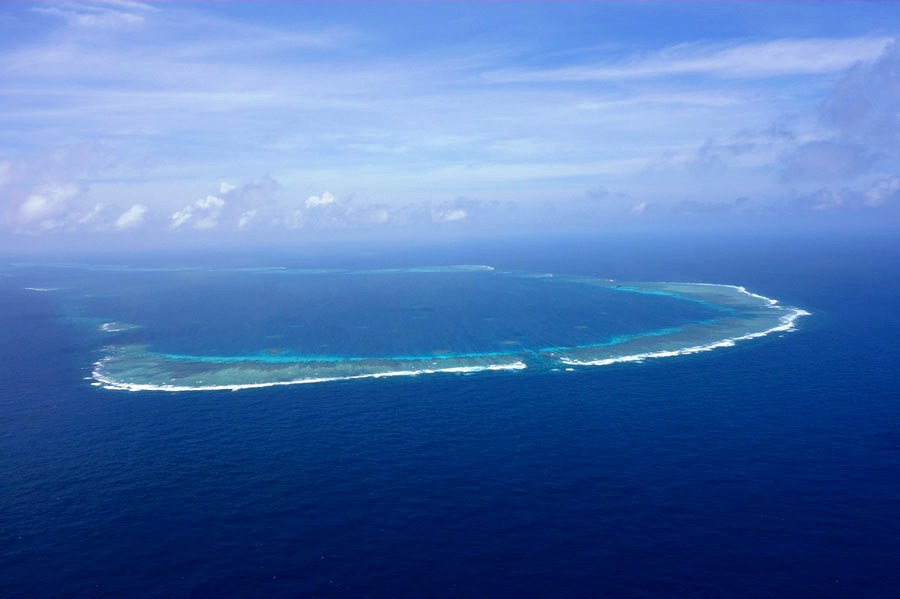Philippines' provocative maritime acts slammed


China urged the Philippines on Monday to halt its provocative acts at sea, stop defaming China and refrain from further compromising peace and stability in the South China Sea region.
"I need to stress that Ren'ai Reef is part of China's Nansha Islands, and China has indisputable sovereignty over Nansha Islands, including Ren'ai Reef, and their adjacent waters. This is a fact that has been established in the long course of history and is in compliance with international laws including the Charter of the United Nations," Foreign Ministry spokeswoman Mao Ning said on Monday at a news conference in Beijing.
She said that China will continue to do what is necessary in accordance with domestic and international laws to resolutely respond to provocative moves that infringe on China's sovereignty, and firmly safeguard the country's territorial sovereignty and maritime rights and interests.
The spokeswoman made the remarks while commenting on the Philippines' accusations against China after an encounter between Chinese and Philippine vessels near Ren'ai Reef on Sunday.
According to Mao, four Philippine vessels intruded into the waters near Ren'ai Reef on Sunday in an attempt to transport construction materials to the illegally grounded warship at the reef.
The Philippine ships repeatedly tried to sail into lagoons surrounding the reef, disregarding warnings from China Coast Guard vessels and made dangerous maneuvers to ram into the coast guard ships.
The Philippine side's acts have seriously violated China's sovereignty and endangered the safety of Chinese ships and personnel, the spokeswoman said.
"In response, the China Coast Guard took necessary enforcement measures that were professional, restrained, justified and legitimate. The Foreign Ministry has lodged solemn representations and expresses strong protest to the Philippines," she noted.
The Philippines is fully responsible for the several incidents that have occurred recently in the waters off Ren'ai Reef, Mao said.
"The root cause is that the Philippines broke its promise and refused to tow away the illegally grounded warship, and attempted to make large-scale reinforcement to the ship so that it could permanently occupy the reef," the spokeswoman said.
China firmly opposes the Philippines' attempt to occupy Ren'ai Reef and has expressed its solemn position to the Philippines, Mao said.
"However, the Philippine side, in disregard of China's goodwill, good faith and restraint, broke its promise and kept stirring up trouble by infringing on China's sovereignty and making provocative moves in the waters off Ren'ai Reef. It has also been spreading disinformation to hype up the incidents," she said. "This gravely violates international law and the Declaration on the Conduct of Parties in the South China Sea and seriously infringes on China's territorial sovereignty and maritime rights and interests."
Huang Xilian, China's ambassador to the Philippines, met on Monday with Theresa Lazaro, undersecretary for bilateral relations and ASEAN affairs at the Philippine Department of Foreign Affairs, and strongly protested the Philippines' recent infringements and provocations in waters surrounding Huangyan Island and Ren'ai Reef.
Chen Xiangmiao, a senior researcher at the National Institute for South China Sea Studies, said that facing repeated provocations by the Philippines, the Chinese Coast Guard has adopted a relatively restrained and defensive approach, mainly to prevent further escalation of the situation.
"China wants to avoid disrupting the stable situation and positive trends in the South China Sea, and prevent further escalation of maritime disputes between China and the Philippines," he said, adding that the Philippines and external parties such as the United States should not interpret China's restraint as a sign of weakness.
The People's Liberation Army Daily, the flagship newspaper of the Chinese military, said in an editorial published on Monday that China has indisputable sovereignty over islands and reefs in the South China Sea and their adjacent waters, as well as sovereign rights and jurisdiction over relevant waters.
"It must be pointed out that the Philippines' actions cannot be separated from the instigation and encouragement of external forces. Over the years, thanks to the joint efforts of China and ASEAN countries, the situation in the South China Sea has been generally stable," the article said. "However, in order to engage in 'major power competition', certain hegemonic countries have tried every means to stir up trouble, create division and incite confrontation in the region, and even openly endorsed the Philippines' illegal infringement and provocative actions."
The PLA is always on high alert to safeguard national sovereignty and peace and stability in the South China Sea, according to the editorial.
- Manila's audacity in playing with fire risks triggering conflict in the South China Sea: China Daily editorial
- Philippine intrusions prompt warning from China
- Philippine intrusions prompt warning from China
- China urges the Philippines to stop infringing on its sovereignty
- China Coast Guard takes control measures over four Philippine vessels
- Mainland scholar discloses fallacies in Lai's separatist narrative on 'unity'
- University's expulsion of female student ignites online debate
- 4,000 hiking enthusiasts hit rugged trails in Chongqing
- Creative fireworks show held in China's 'fireworks capital'
- Chinese scientists achieve net-negative greenhouse gas emissions via electrified catalysis
- At the gateway to China's resistance, memories of war echo 88 years on





































